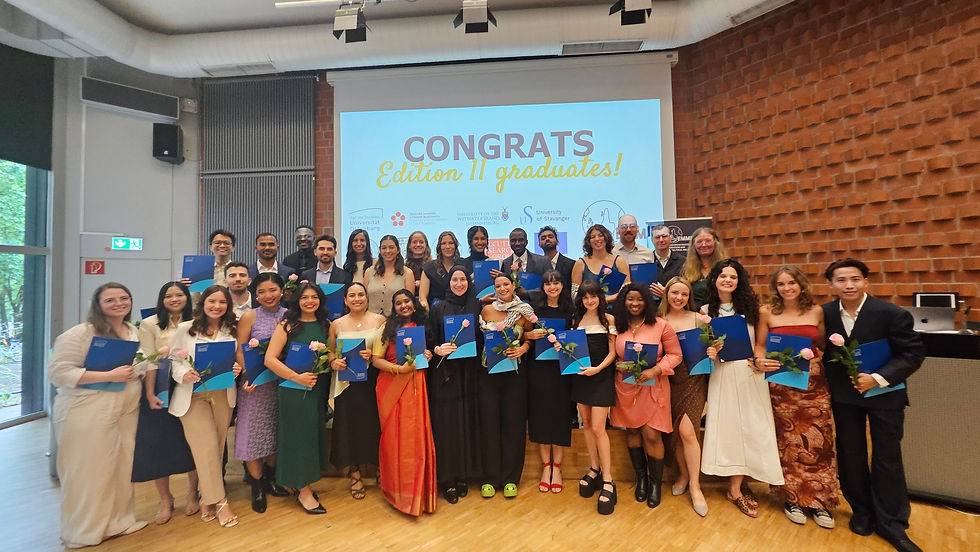10 EMMIR Students Awarded COVID-19 Research Grants
- May 20, 2020
- 3 min read
Updated: Jul 6, 2020
Four groups of EMMIR students in Cohort 8 and Cohort 9 have been awarded Forschen@Studium grants from the University of Oldenburg for research related to the coronavirus. The University of Oldenburg offers grants within the framework of the FNF + project - Research-Based Learning in Focus Plus (German: "Forschungsbasiertes Lernen im Fokus plus") (FLiF+) to assist the students and their research projects.
The University of Oldenburg published a call aimed at students of all Bachelor or Master degree programs at the University of Oldenburg "who are conducting a research project in small groups of at least two people."
The students submitted proposals on the following topics:
"#StayAtHome or Stay Hungry? Inequality is the Greatest Pandemic Latin America has ever Faced” by Vinicius Cruz Campos and Maria Fernanda Madrigal Navarro (Cohort 8)
“Mobile Roots: Notions of Home during the COVID-19 Pandemic” by Lisa Marie Perez Sosa, Alejandra Castellanos Breton, and José Guillermo Ricalde Pérez (Cohort 9)
"The Effects of COVID-19 on Academic Mobility of Erasmus+ Programs: the Case of EMMIR" by Nikola Lero and Roya Emami (Cohort 9)
"International students at the University of Oldenburg: an inquiry on the experience of home-away-from-home" by Ha Luong, Julia Söhnholz , and Sofia Morales (Cohort 8)
EMMIR Cohort 8 and 9 students were impacted by the coronavirus situation, and had to make different considerations in relation to their mobility and their studies. The consequences of the current situation have inspired some of the research.
Roya Emami of Cohort 9, said that "the idea of this research project was sparked from the ordinary conversations on the WhatsApp study group of our cohort. We are studying borders and mobility, but ironically we found ourselves in an era of limited mobility, not caused by ideology or politics, as we were used to, but by a pandemic... I was curious about what my classmates were feeling, and I wanted to record their emotions. Quarantine, confinement, and lack of mobility encourage us to look more closely at our immediate surroundings, and this project is a way of reminding ourselves that we, EMMIR students, are moving in pursuit of our dreams, just like any other migrants."
We are studying borders and mobility, but ironically we found ourselves in an era of limited mobility, not caused by ideology or politics, as we were used to, but by a pandemic... I was curious about what my classmates were feeling, and I wanted to record their emotions.
Nikola Lero, Cohort 9 student, said of his and Roya's research topic: "COVID-19 has and is, profoundly changing my experience as an EMMIR student. It heavily altered my mobility path, but also dreams and expectations of the program. However, it is affecting the lecturers, coordinators, and partner universities too. The question is: how?"

Alejandra, Guillermo, and Lisa told the EMMIR team that, "Since we started our master's program, mobility has been the rule. We found ourselves questioning: What is home? How does it feel? And how is it built up?. We realized there is not a fixed notion of home. For that reason we are interested in understanding the concept of home as 'rhizomes': "There I’ve tried to show how the roots themselves are in a state of constant flux and change. The roots don’t stay in one place. They change shape. They change color. And they grow. There is no such thing as a pure point of origin... but that doesn’t mean there isn’t history" (Hebdige, 1987, p.10). We are so excited to start this journey!"

"I think both of us would say that we feel very excited about the opportunity to present to a German audience some challenges that Latin America faces regarding structural inequality and its relation to the pandemic. It is not so simple to ask people to stay at home when the welfare systems of these countries are practically inexistent," said Vinicius Cruz Campos, of Cohort 8. He and Fernanda will conduct an explorative qualitative analysis of residents of Mexico and Brazil.

On behalf of his research team, Ha Luong shared: "we are excited to work together when researching into the impacts of COVID-19 on international students. As students at an Erasmus Mundus Joint Master Degree from different continents (America, Asia and Europe), we partly understand their experiences during this pandemic through our first-hand ones. Therefore, we believe that our upcoming work will help their sharings be heard when presented to different key stakeholders this November."

The EMMIR team is very excited to support the research with academic supervision by Dr. Lydia Potts; Michal Musialowski, M.A.; and Prof. Dr. Martin Butler.
The University of Oldenburg is supporting 19 total projects under this funding scheme. The four EMMIR groups will carry out their research over the course of the next few months and present their findings in November 2020 at the University of Oldenburg or in a virtual space, depending on distancing guidelines.
Congratulations!





Comments